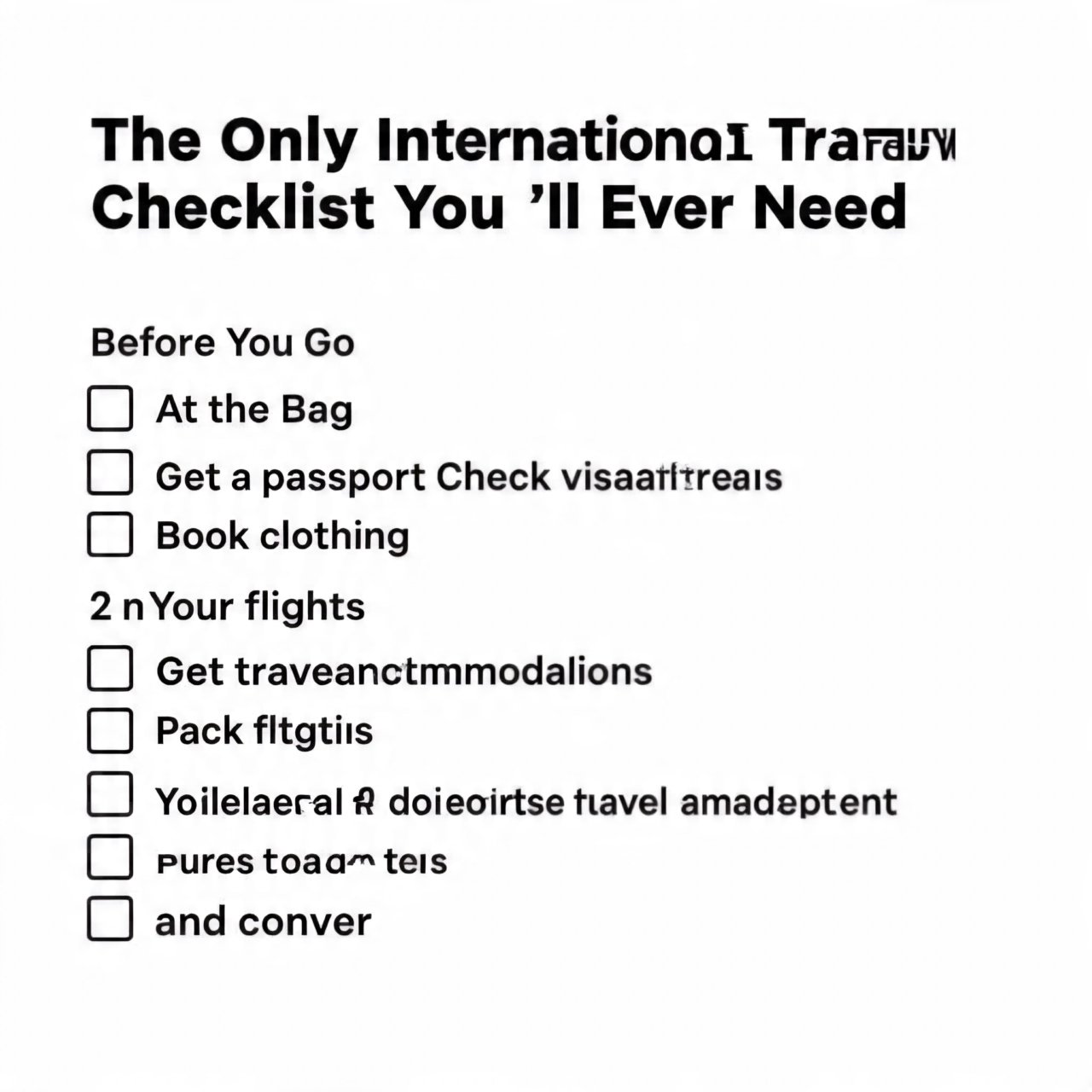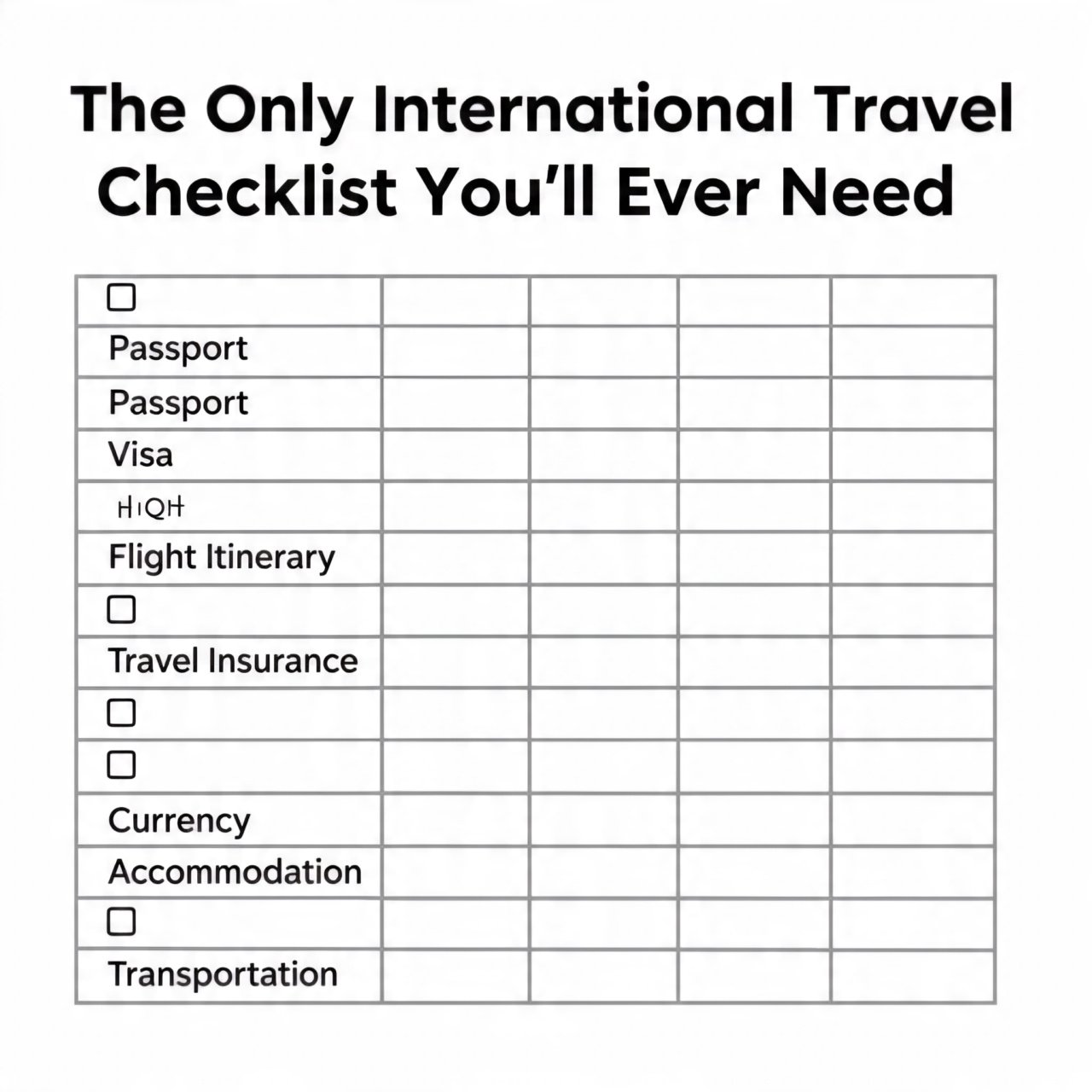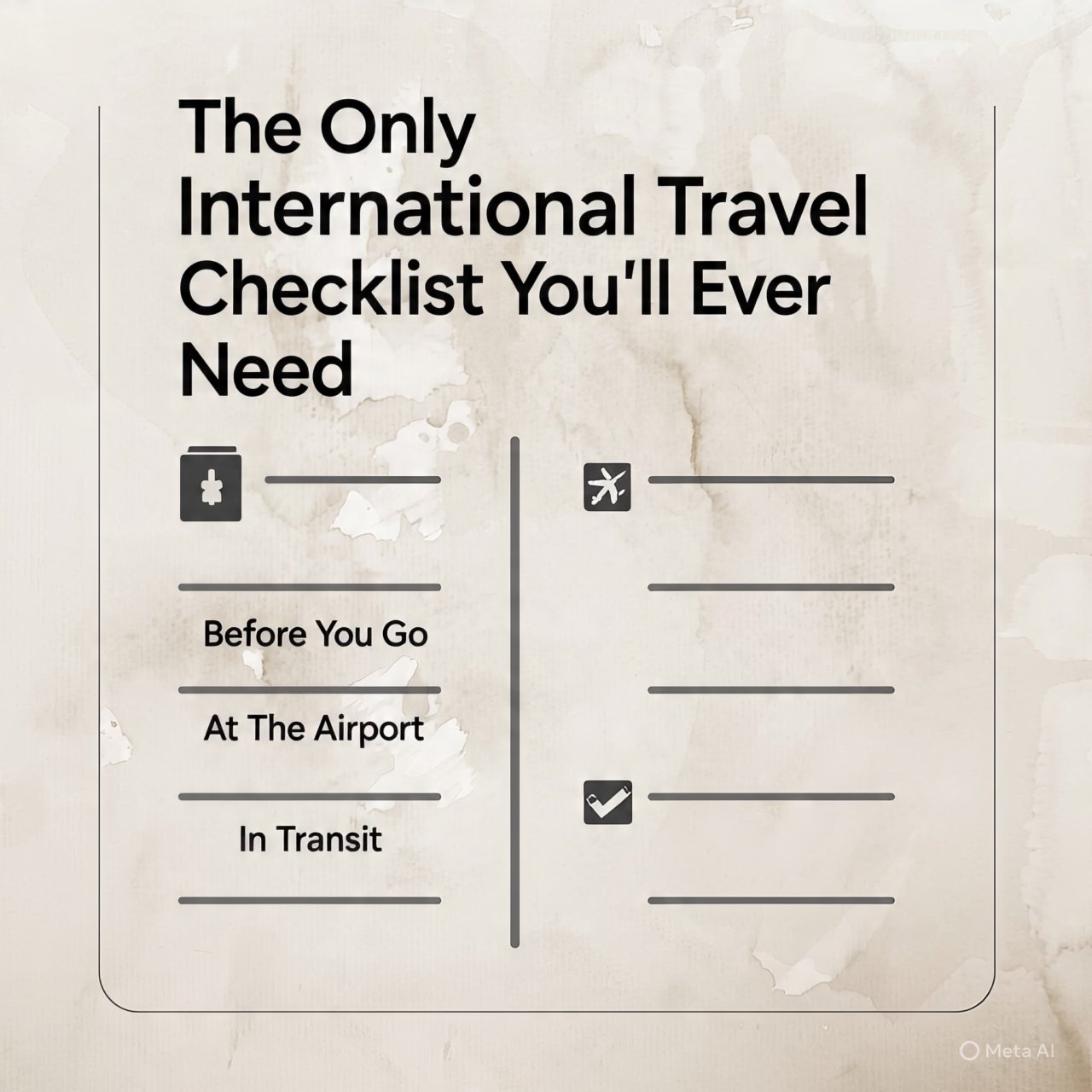The Philosophical Architect’s Guide to Movement: The Only International Travel Checklist You’ll Ever Need
A holistic operating system for the modern voyager.
1) The Framework: Why This “Checklist” Is an Operating System

Conventional travel checklists are a tragic exercise in reductionism, offering a sterile inventory of objects: passport, phone, charger, socks. They treat the sublime, transformative act of international travel as a mere logistical problem to be solved, entirely missing the point. The true preparation for profound journeying is not about what you pack in your suitcase, but what you pack in your mind and how you architect your entire existence—both digital and physical—for seamless global movement. This is not a checklist of items; it is a holistic framework, a philosophical operating system designed for the modern voyager. It is built on the foundational understanding that every successful journey is a triad of equally critical phases: The Prelude (Cognition & Strategy), The Performance (Presence & Execution), and The Postlude (Integration & Refinement). Mastering this framework ensures you are not just a tourist who visited a place, but a traveler who was truly changed by it, returning home not with mere souvenirs, but with an expanded sense of self, and all without a single moment of preventable panic or compromise. This guide moves far beyond the mundane to explore the strategic, psychological, and systemic preparations that form the ultimate, and only, checklist you will ever require.
2) The Prelude: The Cognitive & Strategic Architecture

The Prelude: The Cognitive and Strategic Architecture (Weeks to Months Before Departure) This phase is the cerebral bedrock of your entire journey, where success is truly forged. It begins not with packing, but with intent. Define the core purpose of your voyage: is it immersion, restoration, adventure, or connection? This intent will inform every subsequent decision, from destination choice to daily itinerary. Next, architect your financial and digital infrastructure. This transcends simply notifying your bank; it involves creating a resilient financial web: diversifying your payment methods (two separate credit cards from different networks, a debit card, a hidden emergency cash reserve in a stable currency like USD or EUR, and a digital wallet like Apple/Google Pay), and understanding the currency arbitrage opportunities of using specific cards in specific regions to avoid fees. Digitally, this means conducting a “data audit.” Secure your digital existence by enabling two-factor authentication on all critical accounts (email, banking), installing a reputable VPN on all devices, and uploading scanned copies of your passport, visa, driver’s license, and travel insurance to a secure, cloud-based drive shared with a single trusted contact at home. Then, curate your informational diet. Move beyond generic guidebooks; subscribe to local news feeds from your destination, use Google Street View to “walk” your arrival route from the airport to your accommodation, and download region-specific apps for public transport, food delivery, and emergency services. The final, and most overlooked, element of The Prelude is the creation of a “Domestic Ecosystem.” Your home must not be an afterthought. Automate it: put lights on timers, suspend mail delivery, pre-pay bills, and arrange for a neighbor to conduct periodic wellbeing checks. This creates a “set-and-forget” tranquility, allowing you to be fully present abroad without a lurking anxiety about what you left behind.
3) The Performance: Presence & Execution

The Performance: The Art of Presence and Execution (The Journey Itself) This is the phase where your preparation meets reality. Your goal here is not to execute a rigid plan, but to engage in a fluid, graceful dance with the unexpected. Your physical packing is an exercise in minimalist, modular efficiency. Embrace a “capsule wardrobe” built from technical, quick-dry, and neutral-colored clothing that can be layered and mixed to create numerous outfits from a small number of items. Your personal item is not just a bag; it is a critical-life-support kit designed for resilience against the most common travel failure points: flight delays and lost luggage. It must contain, at a minimum: a full change of clothes, all essential medications (never checked!), a reusable water bottle, a power bank, vital documents, valuable electronics, and a basic toiletry kit. The true performance, however, is mental. This is the practice of “Situational Awareness.” Be observant but not paranoid. Keep your passport and primary funds in a secure, hidden travel pouch, but remain accessible enough to not appear furtive. Practice the “3-Check Rule” before leaving any location: a conscious, physical pat-down of pockets and bags for phone, wallet, and passport. Hydration and rest are not indulgences; they are non-negotiable performance requirements that stave off fatigue-induced errors and illness. Most importantly, relinquish the obsession with documentation. Spend more time breathing in the foreign air, tasting the unique flavors, and engaging in genuine conversation with locals than you do framing the perfect Instagram shot. The most valuable souvenirs are neural, not digital.
4) The Postlude: Return, Integration & Refinement

The Postlude: The Art of Return and Integration (The Final and Most Critical Phase) A journey does not end at passport control upon your return. The unskilled traveler simply dumps their laundry and falls back into old routines, allowing the magic of their experience to fade into a distant memory. The master traveler, however, understands that the return is a crucial phase of integration. This begins practically: upon arriving home, immediately restock your “go-bag” essentials—replace used medications, batteries, and toiletries so your kit is always mission-ready for spontaneous future adventures. Process your expenses within 48 hours while the memories are fresh, categorizing them for future budget refinement. But the true work is reflective. Create a “Travel Digest.” This is not a bland diary, but a curated collection of your experience: ticket stubs, a menu from your favorite meal, a leaf from a memorable hike, and a few paragraphs detailing not what you did, but how you felt and what you learned. This becomes an invaluable artifact of personal growth. Finally, conduct a “Lessons Learned” debrief. Ask yourself strategic questions: What was the single most valuable item I packed? What did I not use at all? Which pre-departure research was accurate, and which was misleading? Which logistical choice (e.g., a specific airline, a particular neighborhood to stay in) proved to be genius, and which was a mistake? This honest analysis is the data that feeds back into The Prelude of your next journey, creating a virtuous cycle of ever-more refined, efficient, and profound travel experiences. This闭环 (closed-loop system) of continuous improvement is the ultimate checklist—a living, evolving practice that ensures each journey is smarter, smoother, and richer than the last.